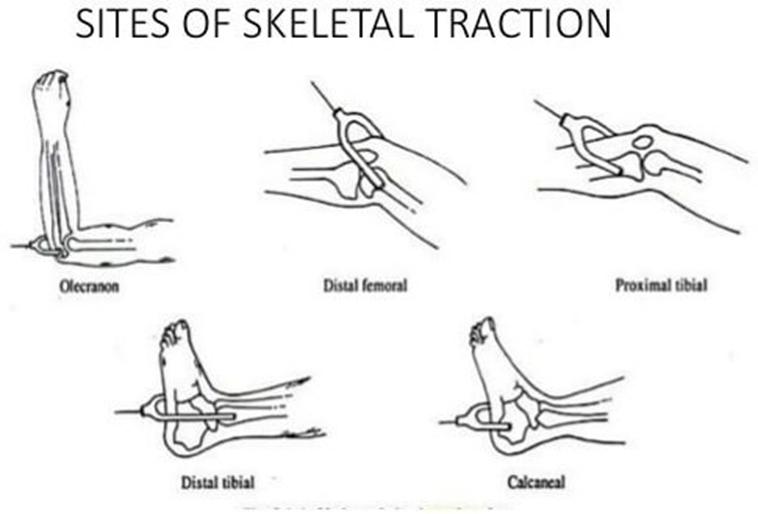Which nursing intervention is appropriate for a client with skeletal traction?
Pin site care
Five-pound weight lifting restriction
Prone positioning
Intermitent weights
The Correct Answer is A
Choice A reason: Pin site care is essential for a client with skeletal traction to prevent infection and ensure proper healing.
Choice B reason: A five-pound weight lifting restriction is not related to the care of a client with skeletal traction.
Choice C reason: Prone positioning is not typically recommended for clients with skeletal traction as it may interfere with the traction setup.
Choice D reason: Intermitent weights are not a standard intervention for skeletal traction, which requires consistent and controlled application of force.

Nursing Test Bank
Naxlex Comprehensive Predictor Exams
Related Questions
Correct Answer is A
Explanation
Choice A reason: Packed RBCs should be transfused as soon as possible once the nurse has prepared everything necessary for the transfusion.
Choice B reason: Waiting 2 hours after obtaining the blood is not necessary and could delay needed treatment.
Choice C reason: The client's mealtime should not delay the transfusion of blood, which is a time-sensitive medical treatment.
Choice D reason: While the client's readiness is important, it should not unduly delay the transfusion if the client is medically stable and the transfusion is necessary.
Correct Answer is B
Explanation
Choice A reason: Dabigatran does not specifically slow the ventricular response; medications like beta-blockers are typically used for rate control in atrial fibrillation.
Choice B reason: Dabigatran is an anticoagulant that reduces the risk of stroke and systemic embolism in patients with nonvalvular atrial fibrillation by preventing clot formation.
Choice C reason: Dabigatran does not convert atrial fibrillation to sinus rhythm; that would be the role of antiarrhythmic drugs or procedures like cardioversion.
Choice D reason: While dabigatran can prevent clots from forming, it is not used to dissolve existing clots; thrombolytic agents are used for that purpose.
Whether you are a student looking to ace your exams or a practicing nurse seeking to enhance your expertise , our nursing education contents will empower you with the confidence and competence to make a difference in the lives of patients and become a respected leader in the healthcare field.
Visit Naxlex, invest in your future and unlock endless possibilities with our unparalleled nursing education contents today
Report Wrong Answer on the Current Question
Do you disagree with the answer? If yes, what is your expected answer? Explain.
Kindly be descriptive with the issue you are facing.
